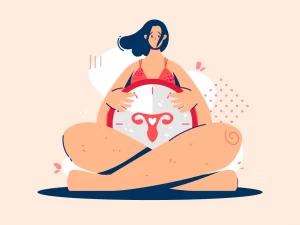
Vasomotor symptoms are a group of symptoms associated with the changes in blood flow and blood vessel constriction and dilation that occur in the body. They are most commonly associated with the hormonal changes that occur during menopause, and they can include hot flashes, night sweats, flushing, and headaches. These symptoms can be extremely disruptive to daily life and can have a significant impact on a woman’s quality of life. While there is no cure for vasomotor symptoms, there are several treatments available to help manage and reduce their severity, including hormone therapy, non-hormonal medications, and lifestyle changes such as exercise, stress management, and changes to diet and sleep patterns.
The following are some of the risk factors associated with vasomotor symptoms:
- Age: The onset and severity of vasomotor symptoms is directly related to the age of the woman. Women who go through menopause earlier in life are more likely to experience more severe symptoms.
- Genetics: Some studies suggest that genetics may play a role in the development of vasomotor symptoms. Women with a family history of menopausal symptoms are more likely to experience these symptoms themselves.
- Smoking: Women who smoke are more likely to experience vasomotor symptoms, and the symptoms are often more severe in women who smoke.
- Obesity: Women who are overweight or obese are more likely to experience vasomotor symptoms, and the symptoms are often more severe in these women.
- Stress: Women who experience high levels of stress are more likely to experience vasomotor symptoms, and the symptoms are often more severe in these women.
- Alcohol consumption: Women who consume alcohol are more likely to experience vasomotor symptoms, and the symptoms are often more severe in these women.
- Hormonal therapy: Women who use hormonal therapy to manage their symptoms are more likely to experience vasomotor symptoms.
It’s important to keep in mind that the presence of these risk factors does not guarantee that a woman will experience vasomotor symptoms. Similarly, the absence of these risk factors does not guarantee that a woman will not experience these symptoms.
There have been several recent trends in the treatment and management of vasomotor symptoms (VMS) associated with menopause:
- Increased focus on non-hormonal options: While hormonal therapy (HT) remains the most effective treatment for VMS, there has been a growing interest in finding safe and effective non-hormonal options. This is due to concerns about the long-term risks associated with HT and the desire for women to have more options to choose from.
- Personalized medicine: Healthcare providers are recognizing the importance of individualized treatment plans for VMS, as the severity and frequency of symptoms can vary greatly from woman to woman. A one-size-fits-all approach may not be effective, and healthcare providers are increasingly looking at a variety of factors such as age, medical history, and lifestyle to determine the best treatment plan.
- Integration of complementary and alternative medicine (CAM): CAM practices, such as acupuncture, mindfulness-based therapies, and herbal supplements, are being increasingly used in conjunction with conventional treatments to manage VMS.
- Technological advancements: There has been a growing interest in developing wearable technologies, such as smartwatches and skin patches, to monitor and manage VMS. These technologies can provide real-time data and insights on symptoms, allowing for more personalized treatment plans.
It’s important to note that these trends are still evolving, and more research is needed to determine the most effective treatments for VMS. Women should consult with a healthcare provider to determine the best treatment plan for their individual needs.
The treatment for vasomotor symptoms (VMS) associated with menopause can vary based on the individual and the severity and frequency of symptoms. Some common treatment options include:
- Hormonal therapy (HT): This is the most effective treatment for VMS and involves taking estrogen or a combination of estrogen and progesterone to restore hormonal balance.
- Low-dose antidepressants: Certain antidepressants, such as venlafaxine and fluoxetine, can help reduce hot flashes.
- Gabapentinoids: Drugs such as gabapentin and pregabalin have been shown to be effective in treating hot flashes.
- Mindfulness-based therapies: Practicing mindfulness, such as meditation and deep breathing, can help manage stress and reduce the frequency and severity of hot flashes.
- Lifestyle changes: Simple changes, such as avoiding triggers that worsen hot flashes (such as spicy foods and alcohol) and engaging in regular physical activity, can help alleviate symptoms.
It’s important to consult with a healthcare provider to determine the best treatment plan for your individual needs and to discuss the potential risks and benefits of each option.

